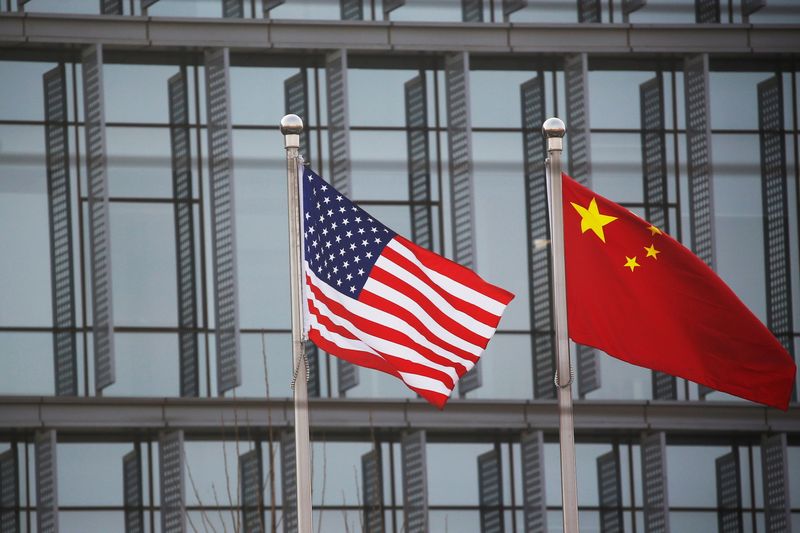By Michael Martina and Trevor Hunnicutt
WASHINGTON (Reuters) - The United States will target China with a new "strike force" to combat unfair trade practices, the Biden administration said on Tuesday, as it rolled out findings of a review of access to critical products, from semiconductors to electric-vehicle batteries.
The "supply chain trade strike force," led by the U.S. trade representative, is looking for specific violations that contributed to a hollowing out of supply chains that could be addressed with tariffs or other remedies, including toward China, White House senior director for international economics and competitiveness Peter Harrell told reporters.
Officials also said the Department of Commerce is considering initiating a Section 232 investigation into the national security impact of neodymium magnet imports used in motors and other industrial applications, which the United States largely obtains from China.
President Joe Biden ordered the review of critical supply chains in February, requiring executive agencies to report back within 100 days on risks to U.S. access to critical goods like those used in pharmaceuticals as well as rare earth minerals, for which the United States is dependent on overseas sources.
Though not explicitly directed at China, the review is part of a broader Biden administration strategy to shore up U.S. competitiveness in the face of challenges posed by the world's second-largest economy.
"We’re trying to understand all of the logistics behind the supply chain” to loosen bottlenecks, Jared Bernstein, an economic adviser to Biden, told Reuters. “One of the best ways to do that is to talk to people in the industry and we’re doing a lot of that."
The United States faced serious challenges in obtaining medical equipment during the COVID-19 epidemic and now faces severe bottlenecks in a number of areas, including computer chips, stalling production of goods, such as cars.
While the White House said it is working closely with private industry to find solutions for the shortages, officials also said companies were part of the problem.
"Decades of focusing on labor as a cost to be managed and not an asset to be invested in have weakened our domestic supply chains, undermining wages and union density for our workers," and made it harder for companies to find skilled talent, Sameera Fazili, deputy director of the National Economic Council, told reporters.
U.S. agencies are required to issue more complete reports a year after Biden's order, identifying gaps in domestic manufacturing capabilities and policies to address them.
TRADE WARS WITH ALLIES NOT WANTED
But the White House offered little in the way of new measures to immediately ease chip supply shortages, noting in a fact sheet that the Commerce Department would work to "facilitate information flow" between chip makers and end users and increase transparency, a step Reuters previously reported https://www.reuters.com/business/autos-transportation/exclusive-facing-chips-shortage-biden-may-shelve-blunt-tool-used-covid-fight-2021-05-05.
In medicine, the administration will use the Defense Production Act to accelerate efforts to manufacture 50 to 100 critical drugs domestically rather than relying on imports.
And to address supply bottlenecks from lumber to steel that have raised fears of inflation, the administration is starting a task force focused on homebuilding and construction, semiconductors, transportation, as well as agriculture and food.
"We fully expect these bottlenecks to be temporary in nature and to resolve themselves over the next few weeks," said Fazili.
Semiconductors are a central focus in sprawling legislation currently before Congress, which would pump billions of dollars into creating domestic production capacity for the chips used in everything from consumer electronics to military equipment.
Biden has said China will not surpass the United States as a global leader on his watch, and confronting Beijing is one of the few bipartisan issues in an otherwise deeply divided Congress.
But some lawmakers have expressed concerns that a package of China-related bills includes huge taxpayer-funded outlays for companies without safeguards to prevent them from sending related production or research to China.

The White House said a measure of success of the supply chain effort would be more diverse suppliers for crucial products from like-minded allies and partners, and fewer from geopolitical competitors.
"We know that as we strengthen cooperation with our allies and partners, we also have to push back against unfair trade practices by competitor nations that have hollowed out the U.S. industrial base and undermine our supply chain security," said Harrell.